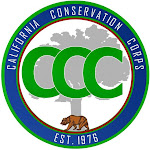Overview of the CCC
Employment of Corpsmembers
The CCC hires young men and women between 18 and 25 for a year of natural resource work and emergency response. Corpsmembers earn minimum wage and work throughout the state in urban, suburban and rural areas.
CCC -- Emergency Response Work
For more than 30 years, the CCC has responded to floods, fires, mudslides, earthquakes, oil spills and agricultural pest infestations throughout California. Since 1976, more than nine million hours of emergency response work has been provided.
In 2008, the CCC devoted 141 days straight to fire response, from June to October, calling out the most fire crews in the department’s history.
The CCC can dispatch trained crews of 10-15 corpsmembers within hours, anywhere in the state. Transportation, supervision, tools and safety gear are supplied. Corpsmembers are trained in incident command systems, fire camp support, first aid, CPR, and tool use. They are covered by worker’s compensation and undergo a Department of Justice fingerprint background check.
CCC Partnerships with Other Agencies
Throughout the year, the CCC provides natural resource work for many state, federal and local agencies through work contracts.
The CCC’s largest state work sponsor is Caltrans. Caltrans pays the CCC personnel $18/hour; the agency calculates it would cost $32-36/hour for other labor sources if the CCC were not available.
As a cost-cutting measure, it has been proposed that CAL FIRE could save money by hiring Emergency Workers at $8-10/hour for its fire camp personnel, rather than use CCC corpsmembers. But, while the CCC can be dispatched immediately to fires, CAL FIRE would need to recruit and hire Emergency Workers after the incident is underway. In addition, their wages do not fund hiring, training, workers’ compensation, supervision, tools and safety equipment or transportation.
Apart from the conservation benefits of CCC projects undertaken for government agencies, there are lasting values in the job skills the corpsmembers receive. These skills enable them to successfully join the California workforce after their year in the CCC.
Meeting the CCC Mission
The Public Resources Code describes the California Conservation Corps’ mission as “instilling basic skills and a healthy work ethic in California youth, building their character, self-esteem, and self-discipline, and establishing within them a strong sense of civic responsibility and understanding of a value of day’s work for a day’s wages.” The CCC is also charged with enhancing the educational opportunities and employability of corpsmembers.
With major budget reductions in recent years making it more difficult to meet its mission, the CCC has not waivered from this focus, while realizing increased efforts are needed. High school courses have been provided by two charter high schools (John Muir and Eagles Peak), and since FY 2003-04, the GED/High School graduation rate has increased. IN FY 2007-08, 25 percent more corpsmembers completed their GEDs/HS diplomas than in the previous fiscal year. The CCC has continued to pursue an after-paid-hours education and training program for its corpsmembers. This has included academic courses, career development training, environmental education, community volunteer hours, leadership training and life-skills development.


.JPG)






